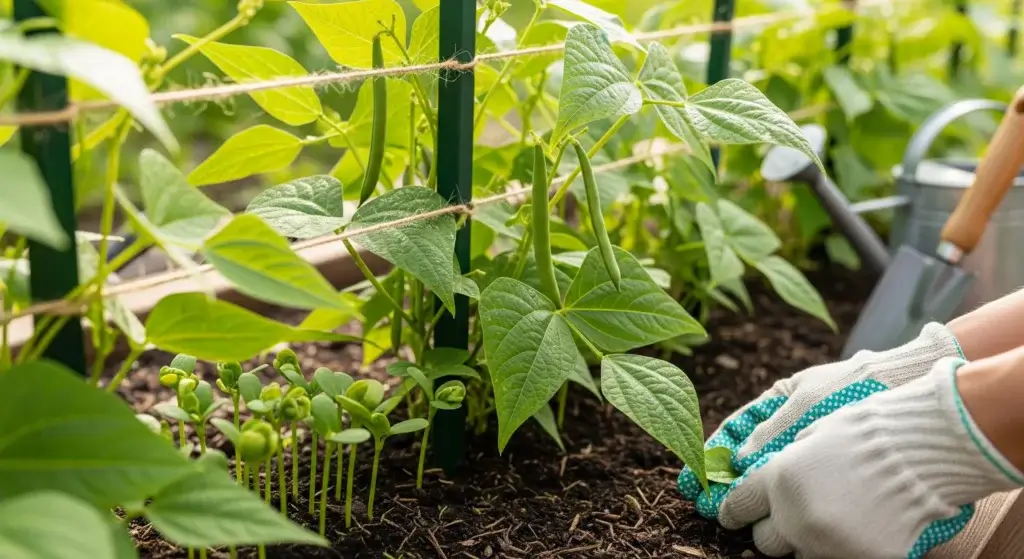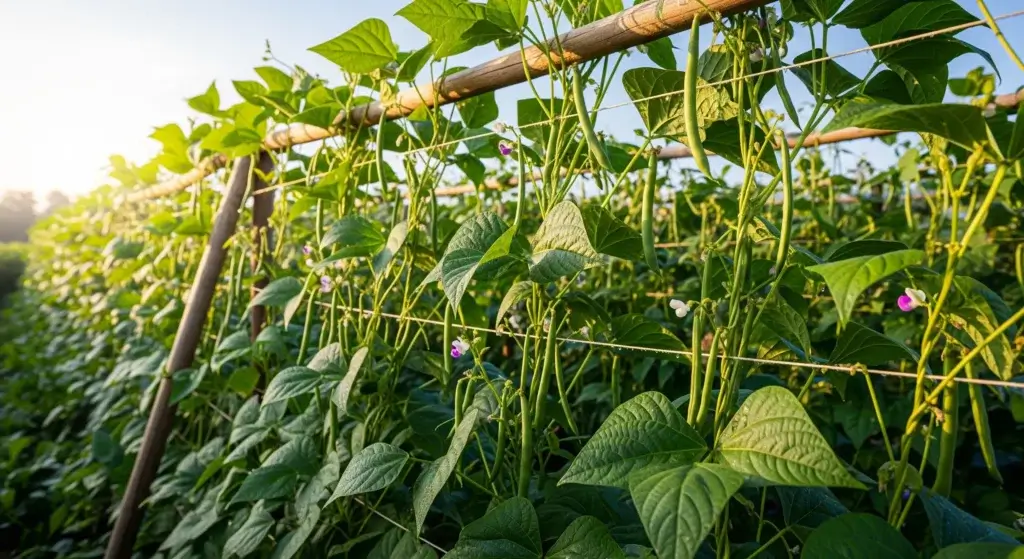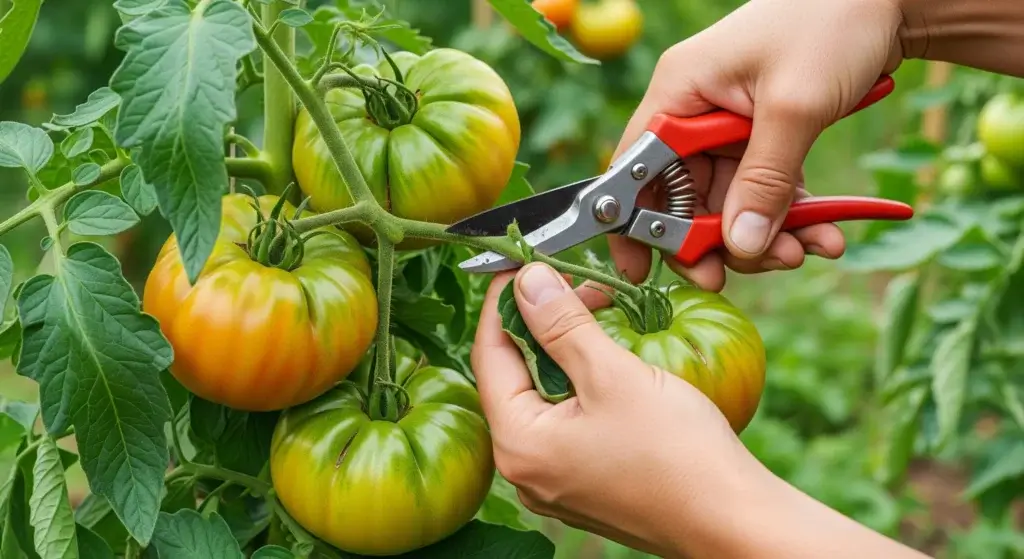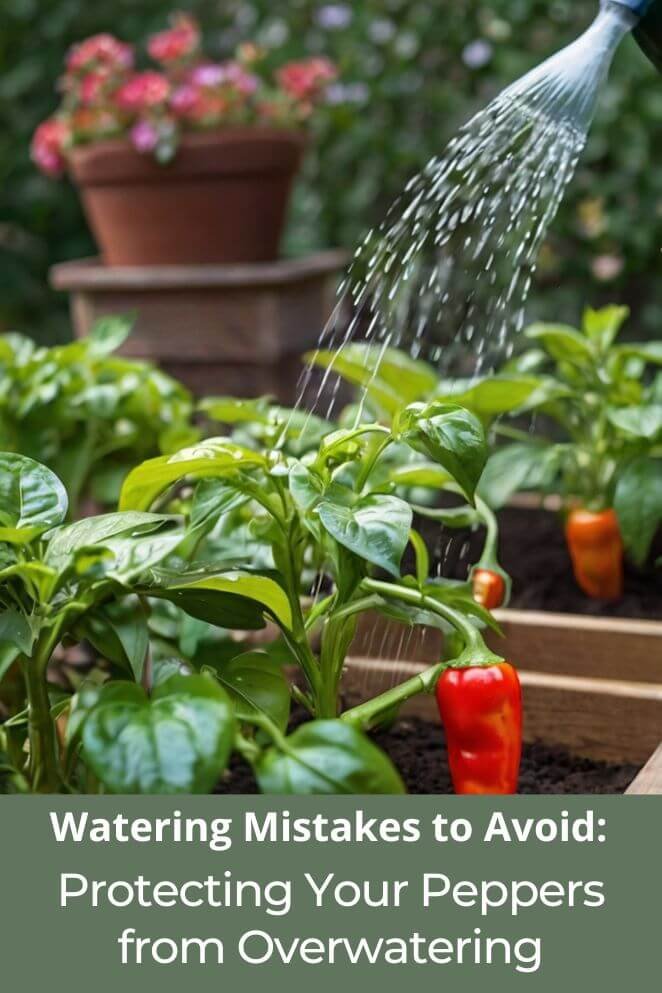
Watering pepper plants requires careful attention to their specific needs to avoid issues such as wilting, root rot, and blossom end rot.
Generally, peppers need about 1 to 2 inches of water per week, but this can vary based on factors like growth stage, climate, and whether they are grown in containers or the ground.
One common problem that often trips up both beginner and experienced gardeners is watering, specifically overwatering.
Overwatering is a common problem that can seriously harm your pepper plants.
It happens when the soil retains too much moisture, preventing the roots from getting the oxygen they need.
Watering Needs Pepper Plants
Pepper plants thrive in warm, sunny conditions and prefer soil that drains well.
If you understand their watering needs, you can avoid problems like root rot or stunted growth.
Here are a few important points to keep in mind:
- Consistent moisture: Peppers like their soil to stay evenly moist, but not soaked. The goal is to keep the soil damp without making it waterlogged.
- Well-draining soil: Choose soil that drains easily, if water tends to sit on top or puddle around the plant, it can lead to root rot. You can mix in compost or sand to improve drainage if needed.
- Avoid soggy soil: Water that sits around the roots for too long can suffocate the plant. This can cause the roots to rot and prevent the plant from absorbing nutrients properly.
- Adapt to weather: During hot, dry spells, your peppers may need more frequent watering. After heavy rains, you might need to hold off on watering for a few days to prevent overwatering.
- Check the soil: Stick your finger about an inch into the soil. If it feels dry, it’s time to water and if it still feels damp, wait a little longer.
- Root health: Healthy roots are the foundation of a strong pepper plant. Too much water can suffocate the roots, while too little can cause them to dry out.
- Container plants: If you’re growing peppers in pots, they can dry out faster than those in garden beds. Containers need to have drainage holes to prevent water from sitting at the bottom.
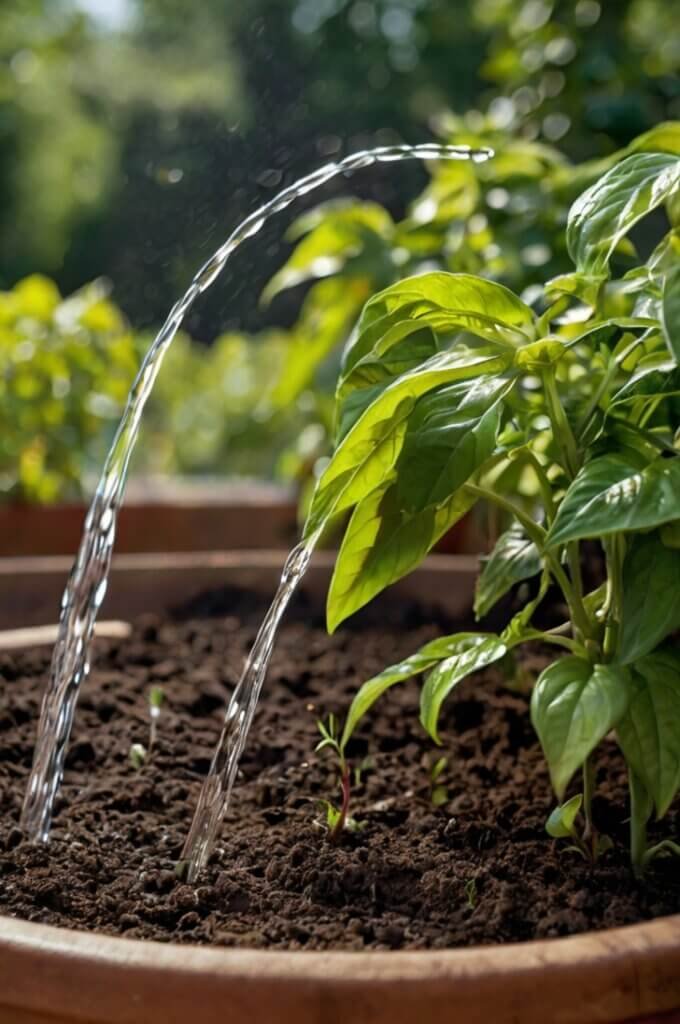
The Signs of Overwatering
Spotting overwatering early can save your pepper plants. Here are some telltale signs:
- Yellowing leaves: If the leaves turn yellow, especially the lower ones, it could be a sign that you’re giving your peppers too much water.
- Wilting: It can be confusing, but if your plant is wilting even though the soil is damp, it’s likely a result of overwatering. The roots might be drowning and unable to take in oxygen.
- Root rot: A foul smell from the soil or black, mushy roots when you check beneath the surface is a sure sign of root rot caused by overwatering.
- Stunted growth: If your pepper plants seem to have stopped growing despite receiving plenty of sunlight and nutrients, overwatering might be the culprit.
- Curled leaves: Leaves may curl as a response to poor root health caused by saturated soil conditions, making it difficult for roots to absorb nutrients.
- Mold or mildew: A visible layer of mold or mildew on the soil surface indicates excessive moisture levels.
Common Watering Mistakes to Avoid
Watering too frequently
Many gardeners assume that peppers need daily watering, but that’s rarely the case.
Pepper plants prefer deep watering a few times a week rather than shallow watering every day.
Frequent, light watering can encourage shallow roots, making the plants more susceptible to stress.
Ignoring soil drainage
Good drainage is crucial for peppers.
Planting in heavy clay soil or containers without drainage holes can cause water to pool around the roots.
This increases the risk of overwatering and root rot.
Watering at the wrong time
Watering during the hottest part of the day can lead to evaporation before the roots absorb enough moisture.
Early morning or late afternoon is the best time to water.
This allows the water to soak into the soil without evaporating quickly.
Overwatering seedlings
Seedlings are delicate and need less water than mature plants.
Keeping their soil constantly wet can lead to damping-off disease.
Damping-off disease is a fungal issue that can quickly kill young plants.
Misinterpreting wilting
Sometimes, pepper plants wilt in the afternoon heat, even if they have enough water.
This is a natural response to protect themselves from excessive heat.
Rushing to water them immediately can lead to overwatering.
Check the soil first—if it’s still moist, hold off on watering.
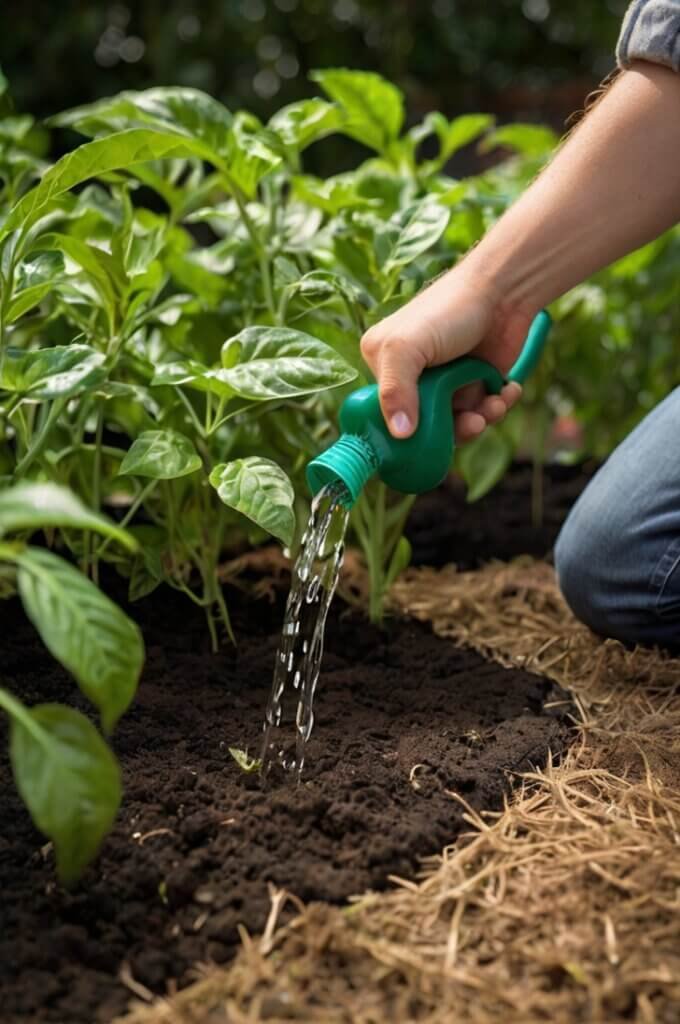
Correct Overwatered Pepper Plants
To fix overwatered pepper plants, follow these steps to help them recover effectively:
Stop watering
Immediately cease watering your plants.
Overwatered plants can exhibit signs of wilting and yellowing, but they are actually suffering from excess moisture rather than a lack of water.
Allow the soil to dry out to normalize moisture levels.
Improve drainage
If the soil is compacted or retains too much water, consider amending it with organic matter like compost to enhance drainage and aeration.
You can also create raised beds or mounds to help excess water drain away from the roots more effectively.
For plants in containers, ensure that your pots have adequate drainage holes and that they are not sitting in standing water.
If necessary, consider repotting into fresh, dry potting soil that can help draw out excess moisture from the roots
Prune damaged parts
Remove any dead or dying leaves.
Prune away any rotting roots if the plant has wilted significantly.
This helps redirect energy towards healthier parts of the plant.
Monitor soil moisture
After implementing these changes, regularly check the soil moisture before watering again.
Water only when the top inch of soil feels dry, ensuring you do not overwater again during recovery.
Provide shaded area
Create a shaded area for your pepper plants in a garden bed.
Use lightweight materials like shade cloth and build a simple frame using PVC pipes or wooden stakes.
For plant in containers, relocate the plants to a shaded spot to reduce stress.
While it may seem counterintuitive, this will help prevent further evaporation stress and allow the plant to stabilize.
Reintroduce sunlight gradually
If your pepper plants were previously exposed to direct sunlight, slowly reintroduce them to sunlight by starting with partial morning sun.
This gradual exposure helps minimize additional stress on the plants.
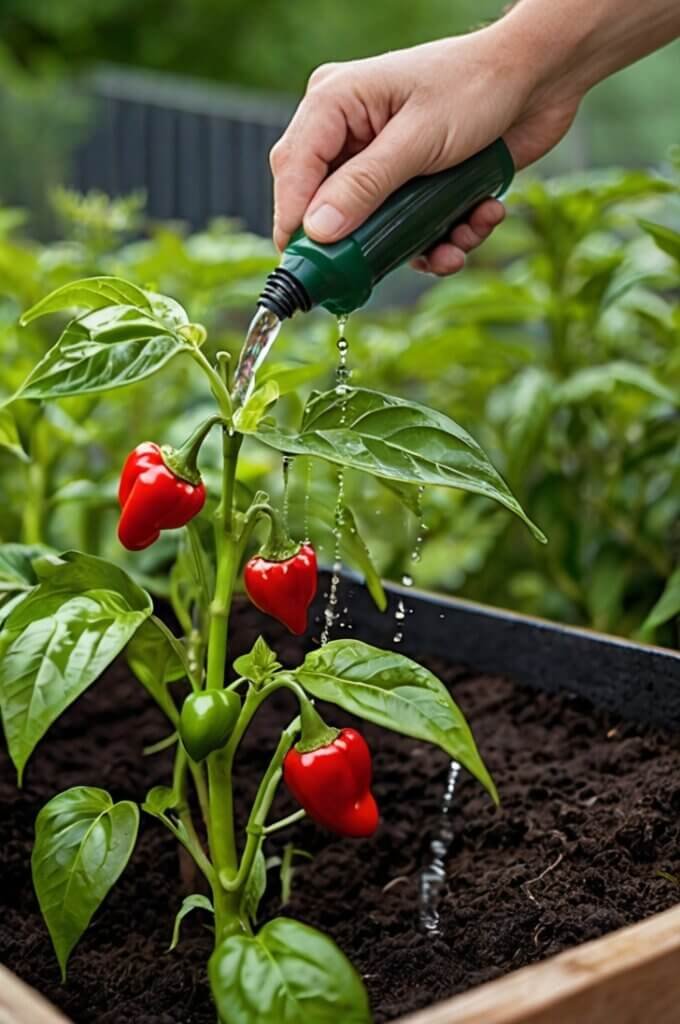
Conclusion
Getting the watering balance right is key to growing healthy, productive pepper plants.
Overwatering is a common mistake, but it’s easily avoidable with a little attention and care.
By checking soil moisture, watering deeply but less frequently, and ensuring good drainage, you can protect your peppers from overwatering and set them up for success.
FAQs
Yes, if caught early. Allow the soil to dry out, improve drainage, and trim any damaged roots.
Not necessarily. Even in hot weather, deep watering a few times a week is usually better than daily shallow watering.
Dry, crispy leaves, wilting, and drooping stems are common signs of underwatering. Checking soil moisture regularly is the best approach.

